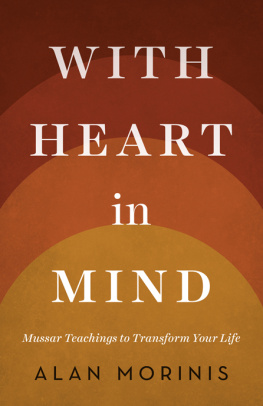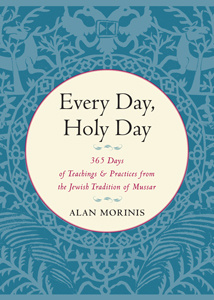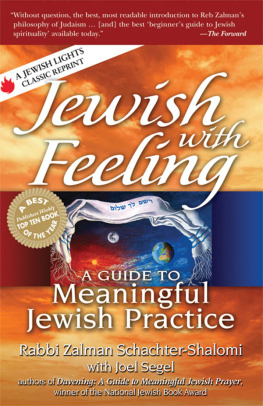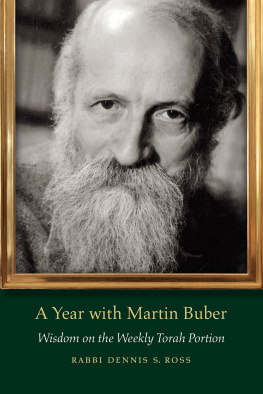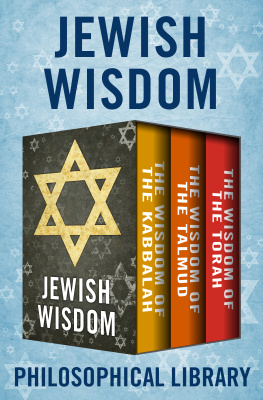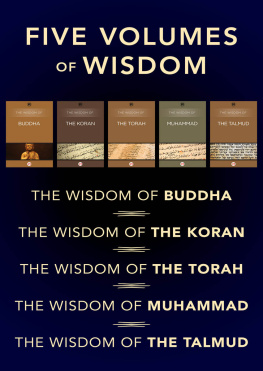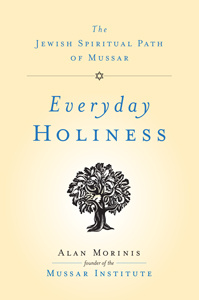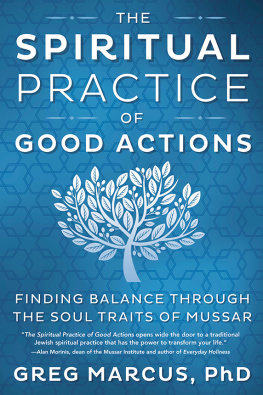ABOUT THE BOOK
Here is a spiritual practice for developing a strong and open heartdrawn from Judaisms Mussar tradition. Mussar draws from the vast storehouse of Jewish wisdom, law, revelation, and text and brings it right home in a way that is completely practical. Judaism teaches that Torah (the collective wisdom of the tradition) provides the blueprint for human experienceand so the more of it we acquire, the more we gain a clearer, truer perspective on life and learn how to navigate its pathways. The phrase acquiring Torah is code for the process of internalizing this wisdom to bring about a genuine transformation of the inner self.
In short, accessible chapters, this book describes forty-eight methods through which we can acquire Torahand turns them into a straightforward practice. These methods include cultivating humility, joy, awe, goodheartedness, closeness with friends, not taking credit for oneself, judging others favorably, and so on. The fruit of working through each quality or method is a refined soul and a strong and open heart.
ALAN MORINIS completed his doctorate at Oxford University, which he attended on a Rhodes Scholarship. A producer of award-winning television and film, he has been a student of the Mussar tradition since 1997, studying under Rabbi Yechiel Yitzchok Perr. Alan is the founder and director of the Mussar Institute, an organization that promotes the study of Mussar through study groups, courses, and public talks. He lives in Vancouver, British Columbia, with his wife and two daughters.
Sign up to receive news and special offers from Shambhala Publications.

Or visit us online to sign up at shambhala.com/eshambhala.
With Heart in Mind
MUSSAR TEACHINGS TO TRANSFORM YOUR LIFE

Alan Morinis

TRUMPETER
Boston & London
2014
Trumpeter Books
An imprint of Shambhala Publications, Inc.
Horticultural Hall
300 Massachusetts Avenue
Boston, Massachusetts 02115
www.shambhala.com
Cover Design by Katrina Noble
2014 by Alan Morinis
All rights reserved. No part of this book may be reproduced in any form or by any means, electronic or mechanical, including photocopying, recording, or by any information storage and retrieval system, without permission in writing from the publisher.
Library of Congress Cataloging-in-Publication Data
Morinis, E. Alan.
With heart in mind: mussar teachings to transform your life / Alan Morinis.
pages cm
eISBN 978-0-8348-2977-0
ISBN 978-1-61180-152-1 (pbk.)
1. Spiritual lifeJudaism. 2. Self-actualization (Psychology) 3. Jewish ethics. I. Title.
BM723.M685 2014
296.7dc23
2013051107
Make for yourself a teacher, acquire for yourself a friend, and judge every person favorably.
PIRKEI AVOT 1:6
This book is dedicated to the many people who have shared with me the toil and joy of building the Mussar Institute, who have been my teachers and my friends, and who have gifted me with their kindness and their love.
Contents
This book is the result of many minds and hearts applying themselves to the question of what it takes for a human being to develop in the direction of the ideal, stretching back to the anonymous authors of Pirkei Avot (Chapters of Root Principles), whose thought provides the core structure for this book.
My dear friends and colleagues at the Mussar Institute, and my students in the Kiyyum program, provided me the opportunity to develop the initial material that formed the foundation for this book. Rabbi Avi Fertig was an invaluable guide and collaborator in the development of some of that course material, and his knowledge and depth of wisdom and understanding show up in so many ways in this rendering.
Rabbi Yechiel Yitzchok and Rebbetzin Shoshana Perr continue to be guiding lights for me in the ways of Mussar, Jewish practice, and life itself. I owe them more than I can say.
Beth Frankl, my able and dear editor, has once again been a steady and supportive presence in bringing this book to completion. If it reads well, credit is to Beth and to her skilled assistant editor, Ben Gleason.
I am grateful to Jim Levine, my literary agent, for handling so well all the aspects of book creation that fall outside my own focus, so that I could give all my energy and attention to the study and writing that I needed to do.
Bev Spring, my beloved wife, and Julia, Aaron, Leora, and Violet are my immediate family members, who nourish my heart and make my life worth living.
And the older I get and the more I walk my path, the more I know with conviction that there is One Source, to whom I bow in gratitude and lift up my voice in praise.
The central concern of Judaism is that you and I accomplish a personal spiritual transformation in our lifetimes. That core intention can be lost in the welter of rituals, festivals, liturgy, and other performative aspects of the tradition. It becomes even less visible when buried under the weight of buildings, institutions, campaigns, and political struggles that are, for some, the face if not the totality of the Jewish world. But the fact remains that, at its core, the driving concern of Judaism is personal spiritual transformation.
How do we know this? For starters, consider the focus of the two holiest days on the ritual calendarRosh Hashanah (the Jewish new year) and Yom Kippur (the day of atonement). Yes, there are hundreds of pages of prescribed prayers and many other ritual acts, but the central focus for these two days (as well as the ten days that fall between them) is a personal stock-taking of the things one did or said in the previous year, followed by steps to repair any damage, to set the stage for different behavior in the year to come. The Jerusalem Talmud puts it clearly, God said, Since you all came for judgment before me on Rosh Hashanah and you left [the judgment] in peace, I consider it as if you were created as a new being.
Redoing ourselvesthe project of becoming a new beingis meant to be the central thrust of our lives. And should you think that you are who you are and that change is not possible, over nine hundred years ago, Rambam, also known as Maimonides, affirmed that it is squarely in our own hands to decide who we will be:
Do not even consider... that the Holy Blessed One decrees upon all people at the time of their births whether they will be good or bad. This is not soevery person has the potential to be as righteous as Moses our Teacher, or as wicked as Jeroboam; clever or stupid, merciful or cruel, miserable or noble, or indeed to possess any of the other qualities. Nobody can force you, decree upon you, or lead you into one of the ways, but you should choose a way out of your own free will....
When we realize that the process of transformation is situated at the center of our lives, then all the circumstances that we live with are revisioned as pathways for our growth. The people we relate to, the work we do, where we live, what we eat, the challenges we face, how we respond to those tests, and the rest all appear to be the pieces we are given to work with as we pursue growth. And we do grow. Just by living and having experiences and thinking and learning, we grow. Are you identical to who you were five or ten years ago? Its just not possible, because the very process of living is set up to generate change. Judaisms concern is to make the processes of change deliberate and conscious, and aimed in a particular direction.
Next page
